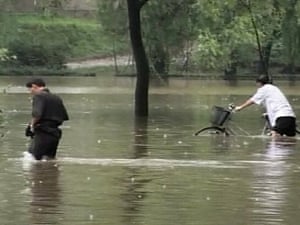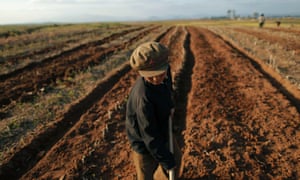North Korea: an unlikely champion in the fight against climate change | World news | The Guardian
North Korea: an unlikely champion in the fight against climate change
Pyongyang is cooperating with global strategy on climate change, writes Dr Benjamin Habib. The question is, why?

Pak Su-dong, manager of the Soksa-Ri cooperative farm in an area hit by floods and typhoons in 2011. Photograph: Damir Sagolj/Reuters
---
Comments40
Benjamin Habib for The Conversation, part of the North Korea network
Tuesday 20 May 2014 18.54 AESTLast modified on Tuesday 5 September 2017 17.18 AEST
When we think of North Korea, we think of a nation determined to be an outsider in the international community. Whether it’s testing nuclear weapons or threatening London hairdressers, the Democratic People’s Republic of Korea is not usually associated with compliance.
But there is compelling evidence that the North Korean government is motivated by domestic power games to co-operate globally on climate change.
North Korea has a record of compliance with its obligations as a party to the United Nations Framework Convention on Climate Change. The obvious question then is why the North Korean government would show such commitment to the international climate change regime, given its belligerent reputation in the strategic realm.
The most obvious link is between environmental degradation, the vulnerable agricultural system and the stability of governance in North Korea. The concept of climate change vulnerability is important there.
Vulnerable nation
Climate change impacts – declining availability of food, water and energy, sea level rise, migration, and extreme weather events – pile more stress onto countries already at risk from internal instability and economic weakness.
Like many poor countries, North Korea, where such problems are endemic, is least able to cope with climate change impacts. These weaknesses include food insecurity, energy shortages, economic fragility and a rigid political system. So North Korea is using the UNFCCC as a vehicle for projects designed to increase agricultural output and build the resilience of the agricultural system to disasters.
FacebookTwitterPinterest Aid groups said severe floods in 2007 would hamper the country's ability to feed itself for at least a year. Photograph: AP
The country exists in a state of near-perpetual food insecurity (the FAO estimatesa food deficit of 207,000 tonnes in 2012-2013), stemming from a structural food deficit along with an inability and unwillingness to buy food from international markets. In these circumstances, any disruption to domestic agricultural production will have a significant impact on the food security of at-risk segments of the population, creating ripple effects across the country’s economy and political system. This illustrates the degree to which food insecurity is an existential problem for the North Korean leadership.
Degradation of the land base is another critical problem requiring technical assistance. Land degradation in the DPRK is a symptom of ideological rigidity in land management, climatic impacts and the country’s energy shortages, exacerbating food insecurity.
The capacity-building assistance made available via the UNFCCC and related programs boosting planting and harvesting efficiency, building soil fertility and reforestation helps to increase the productive capacity of the agricultural sector and enhance its resilience against climate change.
Wind power
Advertisement
The incentives for participation are not confined to agriculture. North Korea is using the UNFCCC as a vehicle for obtaining foreign assistance to upgrade its energy production and transmission infrastructure.
North Korea’s energy security problem is well documented, revolving around four distinct challenges: supply, generation, power transmission, and secondary usage. Of these four challenges, electricity generation and transmission are the two that can be addressed through the UNFCCC.
Renewable energy may be the most appropriate vehicle for increasing generation capacity because unlike large centralised fossil-fuels, renewables can be scaled locally which reduces their up-front cost.
For example, a UNDP-sponsored project is installing small-scale wind energy systems at sites across North and South Pyongan Provinces, helping to alleviate energy shortages affecting these areas by decoupling them from reliance on the coal-generated electricity grid.
FacebookTwitterPinterest A North Korean boy works in a collective farm damaged by floods and typhoons in South Hwanghae province in 2011. Photograph: Damir Sagolj/Reuters
Most significantly, renewables offer North Korea considerable scope for technology transfer, infrastructure upgrades and income through the Clean Development Mechanism under the Kyoto Protocol.
Technology transfers for such projects do not violate the import restrictions of dual-use technologies listed under the UN Security Council sanctions regime against the DPRK. The income potential derives from the carbon credits generated by North Korea’s renewable projects, which can be traded on international carbon markets.
While there is revenue potential in the generation and sale of carbon credits, the magnitude of the potential revenue is comparatively small. Together, the projects already online in North Korea account for 193,475 carbon credits. At the EU spot price for carbon credits of $5.66/ton (£3.36/ton) as of July 2013, North Korea’s current portfolio of carbon credits are worth a mere $1m per year.
North Korea has strong incentives to fight climate change and its potential to erode government control. The fact that the nation has become more compliant over time suggests that the objectives of the international climate change regime coalesce with the survival imperatives of Kim Jong-un’s government.
Dr Benjamin Habib is a lecturer in politics and international relations at La Trobe University in Melbourne, Australia.
---
Comments40
Benjamin Habib for The Conversation, part of the North Korea network
Tuesday 20 May 2014 18.54 AESTLast modified on Tuesday 5 September 2017 17.18 AEST
When we think of North Korea, we think of a nation determined to be an outsider in the international community. Whether it’s testing nuclear weapons or threatening London hairdressers, the Democratic People’s Republic of Korea is not usually associated with compliance.
But there is compelling evidence that the North Korean government is motivated by domestic power games to co-operate globally on climate change.
North Korea has a record of compliance with its obligations as a party to the United Nations Framework Convention on Climate Change. The obvious question then is why the North Korean government would show such commitment to the international climate change regime, given its belligerent reputation in the strategic realm.
The most obvious link is between environmental degradation, the vulnerable agricultural system and the stability of governance in North Korea. The concept of climate change vulnerability is important there.
Vulnerable nation
Climate change impacts – declining availability of food, water and energy, sea level rise, migration, and extreme weather events – pile more stress onto countries already at risk from internal instability and economic weakness.
Like many poor countries, North Korea, where such problems are endemic, is least able to cope with climate change impacts. These weaknesses include food insecurity, energy shortages, economic fragility and a rigid political system. So North Korea is using the UNFCCC as a vehicle for projects designed to increase agricultural output and build the resilience of the agricultural system to disasters.

FacebookTwitterPinterest Aid groups said severe floods in 2007 would hamper the country's ability to feed itself for at least a year. Photograph: AP
The country exists in a state of near-perpetual food insecurity (the FAO estimatesa food deficit of 207,000 tonnes in 2012-2013), stemming from a structural food deficit along with an inability and unwillingness to buy food from international markets. In these circumstances, any disruption to domestic agricultural production will have a significant impact on the food security of at-risk segments of the population, creating ripple effects across the country’s economy and political system. This illustrates the degree to which food insecurity is an existential problem for the North Korean leadership.
Degradation of the land base is another critical problem requiring technical assistance. Land degradation in the DPRK is a symptom of ideological rigidity in land management, climatic impacts and the country’s energy shortages, exacerbating food insecurity.
The capacity-building assistance made available via the UNFCCC and related programs boosting planting and harvesting efficiency, building soil fertility and reforestation helps to increase the productive capacity of the agricultural sector and enhance its resilience against climate change.
Wind power
Advertisement
The incentives for participation are not confined to agriculture. North Korea is using the UNFCCC as a vehicle for obtaining foreign assistance to upgrade its energy production and transmission infrastructure.
North Korea’s energy security problem is well documented, revolving around four distinct challenges: supply, generation, power transmission, and secondary usage. Of these four challenges, electricity generation and transmission are the two that can be addressed through the UNFCCC.
Renewable energy may be the most appropriate vehicle for increasing generation capacity because unlike large centralised fossil-fuels, renewables can be scaled locally which reduces their up-front cost.
For example, a UNDP-sponsored project is installing small-scale wind energy systems at sites across North and South Pyongan Provinces, helping to alleviate energy shortages affecting these areas by decoupling them from reliance on the coal-generated electricity grid.

FacebookTwitterPinterest A North Korean boy works in a collective farm damaged by floods and typhoons in South Hwanghae province in 2011. Photograph: Damir Sagolj/Reuters
Most significantly, renewables offer North Korea considerable scope for technology transfer, infrastructure upgrades and income through the Clean Development Mechanism under the Kyoto Protocol.
Technology transfers for such projects do not violate the import restrictions of dual-use technologies listed under the UN Security Council sanctions regime against the DPRK. The income potential derives from the carbon credits generated by North Korea’s renewable projects, which can be traded on international carbon markets.
While there is revenue potential in the generation and sale of carbon credits, the magnitude of the potential revenue is comparatively small. Together, the projects already online in North Korea account for 193,475 carbon credits. At the EU spot price for carbon credits of $5.66/ton (£3.36/ton) as of July 2013, North Korea’s current portfolio of carbon credits are worth a mere $1m per year.
North Korea has strong incentives to fight climate change and its potential to erode government control. The fact that the nation has become more compliant over time suggests that the objectives of the international climate change regime coalesce with the survival imperatives of Kim Jong-un’s government.
Dr Benjamin Habib is a lecturer in politics and international relations at La Trobe University in Melbourne, Australia.
No comments:
Post a Comment